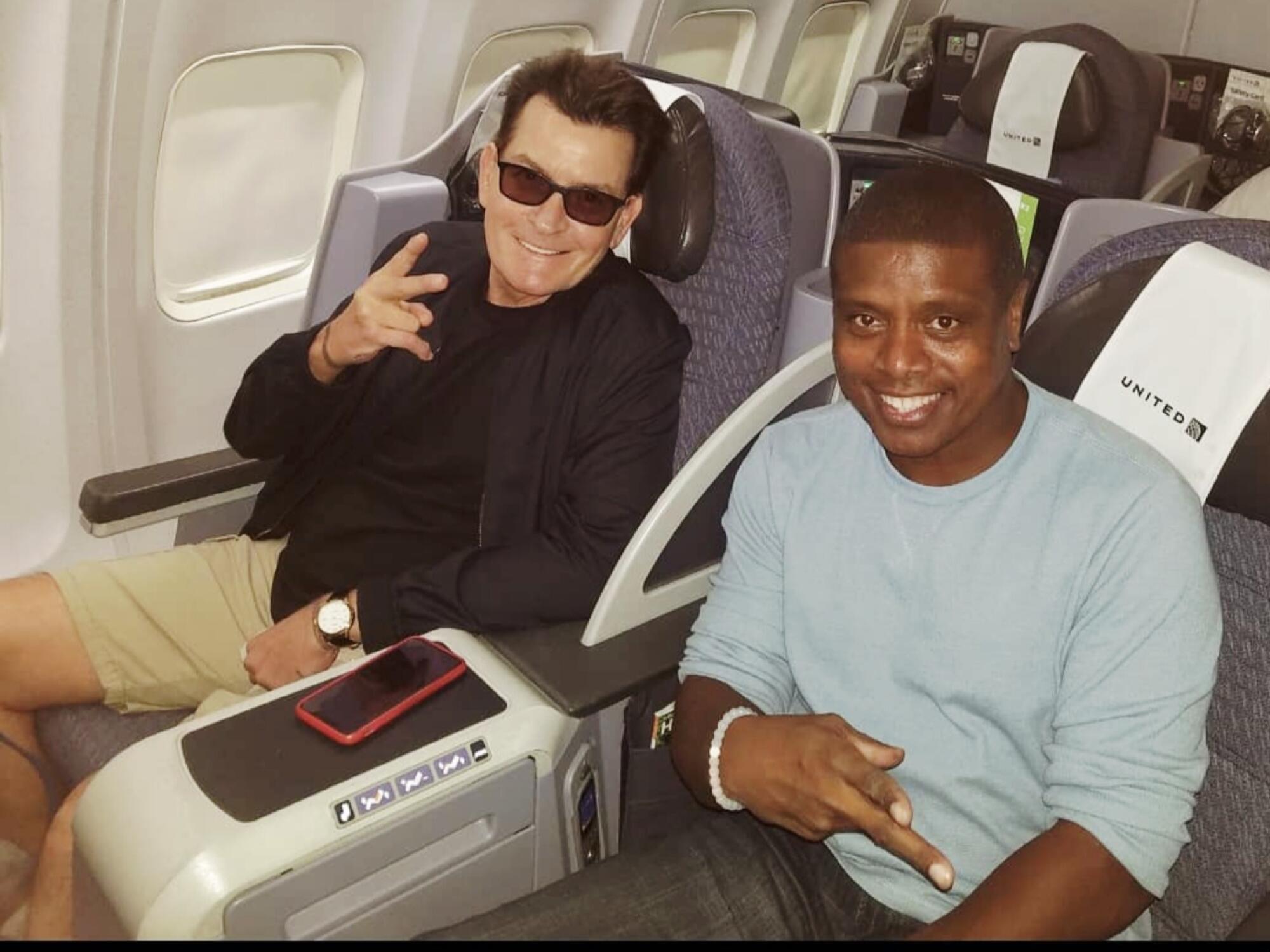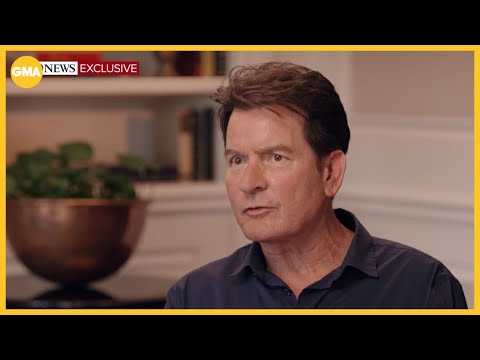Charlie Sheen’s lifelong pal Tony Todd helped rescue him from bedlam
When Charlie Sheen needed his then-13-year-old daughter taken to a hair appointment because he was too drunk to drive, he turned to his sober friend, Tony Todd.
When Sheen wanted to meet Carlos Estévez because the major league pitcher shared Sheen’s given name, he turned to his connected friend, Tony Todd.
When Sheen was in the throes of a crack addiction, fired from his starring role on “Two and a Half Men” and in need of an unwavering voice of encouragement, he turned to his non-judgmental friend Tony Todd.
“There are so many fake friends in Charlie’s life,” Todd said. “I’ve been there for him since we were little kids. The cool thing is, we’ve never had an argument.”
Thanks to the recent Netflix documentary “aka Charlie Sheen” and publication of “The Book of Sheen” memoir, Todd’s 50-year friendship with the mercurial actor has been revealed to the world. Todd’s social media accounts have since been flooded with praise from viewers far and wide.
“I had to reach out immediately to say you were and remain an angel from heaven.”
“You are the friend we would all like to have man, greetings from Spain!”
“Dear Tony, If you ever visit Istanbul, it would be our honor to host you in our hotel…. You are not only a great actor but also a true friend.”
“You … are a stellar human being [heart emoji].”
Todd and Sheen have been pals since they bonded through baseball, first on Little League fields in Malibu, then on the Santa Monica High School team, then while taking batting practice in Sheen’s posh indoor batting cage, then while putting on power-hitting displays at local high school fields and even Dodger Stadium.
And their friendship spread into their private lives, with Todd serving as best man at the first two of Sheen’s three marriages and serving as a drug-free wingman even when Sheen descended into a chaotic, self-destructive morass of cocaine, alcohol and reckless sex.
“There’s never been a call he hasn’t answered, there’s never been a crisis he didn’t help solve,” Sheen said in a phone interview. “Tony Todd has always been a friend, and a true one.”
The documentary “aka Charlie Sheen” is a first-person tell-all, with the narrative helped along by Sheen’s oldest brother, Ramon, childhood neighbor Sean Penn, “Two and a Half Men” co-star Jon Cryer and executive producer Chuck Lorre, drug dealer Marco Abeyta and ex-wives Denise Richards and Brooke Mueller.
And, of course, Todd. He laughs. He cries. He exudes honesty and empathy.
“He’s just one of my favorite people to have around in any situation,” Sheen said.
All of it certainly has made Todd — not to be confused with the actor of the same name who starred in “Candyman” and died a year ago — fame-adjacent.
Although he has enjoyed a career that includes acting/stuntman roles in both “Black Panther” movies and acting roles in the movie “Little Big League,” the TV show “Anger Management” and more than two dozen national commercials, Todd is best known in Santa Monica as the dude who can’t say no to volunteer fundraisers and sports a vanity license plate that reads “NVR KWT.”
Just this summer he helped raise $10,000 for Santa Monica Little League by hosting an outdoor screening of “Little Big League” and tapping into his vast contact list of pro athletes and A-list entertainers to attract silent-auction items.
And Todd was hailed as a “real hero” by authorities after he gave $700 to a family of five who had been robbed of their rent money in Lancaster in 2018. He was “so moved by the family’s story” that he jumped in his car and drove from Santa Monica to the high desert to hand-deliver the money.
His friendship with Sheen resonates with many, in part because Todd professes never to have taken a drug or a drink. Sheen, of course, was the poster man-child of substance abuse until becoming sober in December 2017, the day he relinquished his car keys to Todd to drive his daughter Sami to a hair salon appointment in Moorpark.
When Sheen was addicted to crack, Todd moved into his friend’s Mulholland Estates house in Beverly Hills. Even then, Sheen wouldn’t smoke the drug in Todd’s presence, and they often would end evenings watching MLB Network or ESPN’s “Sports Center.”
“I didn’t do hard stuff in front of him, just out of respect,” Sheen said.
Todd wept in “aka Charlie Sheen” when he explained why he continued to live with his friend knowing the actor was often smoking crack in the next room.
“I just can’t leave him to die,” he said.
Happier times occurred when they would head to a ball field to hit. Years earlier, after suffering a shoulder injury, Sheen had learned to bat left-handed, taking a hundred or so swings a day off an Iron Mike pitching machine in his indoor batting cage.
While filming a DirecTV commercial at Dodger Stadium in 2007, Sheen stepped into the batter’s box during a lunch break and crushed a pitch over the right-field wall. Todd whooped and hollered, in no small part because he had bet a Dodgers employee that his buddy would go deep.
“I knew it was going to happen because of all the [batting practice] we’d been taking,” Todd said.
Sheen also increased his strength by taking massive doses of testosterone, which he mentions in the documentary and alluded to in a 2015 interview when he said his HIV-positive diagnosis wasn’t the reason for his epic meltdown in 2011 after he was fired from “Two and a Half Men.”
“I wish I could blame it on that, but that was more of a ’roid rage,” said Sheen, who earlier had admitted he took steroids ahead of filming the 1989 hit movie “Major League,” in which he played pitcher Ricky (Wild Thing) Vaughn.
Todd had a video shot of batting sessions at Oak Park and Santa Clarita Hart high schools around 2008. Sheen hit a home run Todd estimated traveled 445 feet at Oak Park and hit a barrage of homers at Hart in the presence of Hall of Fame slugger Eddie Murray and the Hart High team.
Todd followed Sheen’s power display at Hart with a home run of his own. Todd was a talented-enough baseball and football player to earn a double scholarship to USC, although a serious injury his senior year in high school cost him the free ride.
His baseball ability landed him the role of Mickey Scales in “Little Big League” and his astonishing speed delighted Sheen even into their 40s. During one of their batting sessions at Oak Park High, Todd was challenged to a race around the bases by an onlooker.
Sheen told the man to start the race at second base while Todd started at home plate.
“By the time they rounded third, Tony had passed him, and after touching the plate he grabbed a glove and pretended to tag the guy when he reached the plate,” Sheen said, laughing.
Todd served as a baseball coach at Santa Monica High for several years, and in 2013 he lobbied for the school to award Sheen his diploma — the actor had been 1½ credits short 30 years earlier and hadn’t graduated.
Todd reached out to his friend Ross Mark, who handled bookings for “The Tonight Show With Jay Leno,” and they concocted a plan to have Sheen on as a guest and for Leno to surprise him with the diploma.
Todd walked on stage with the diploma and Sheen — who had quickly donned a cap and gown — gave him a hug, his lifelong friend having effectively smoothed over one more rough patch in his life.


